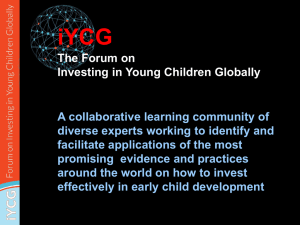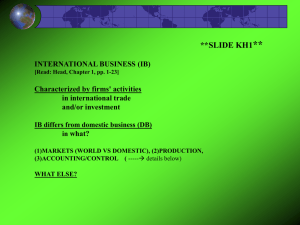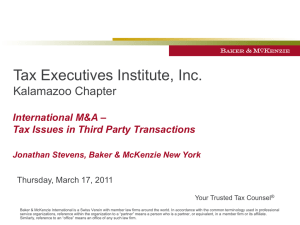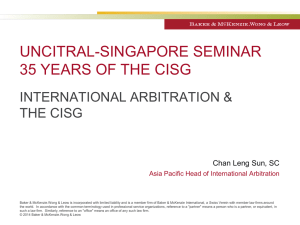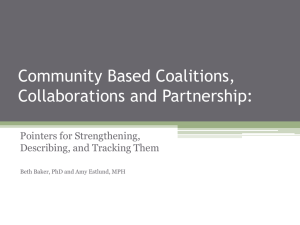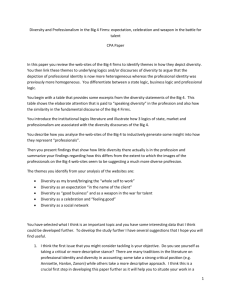Competitiveness issues around globally integrated services delivery
advertisement
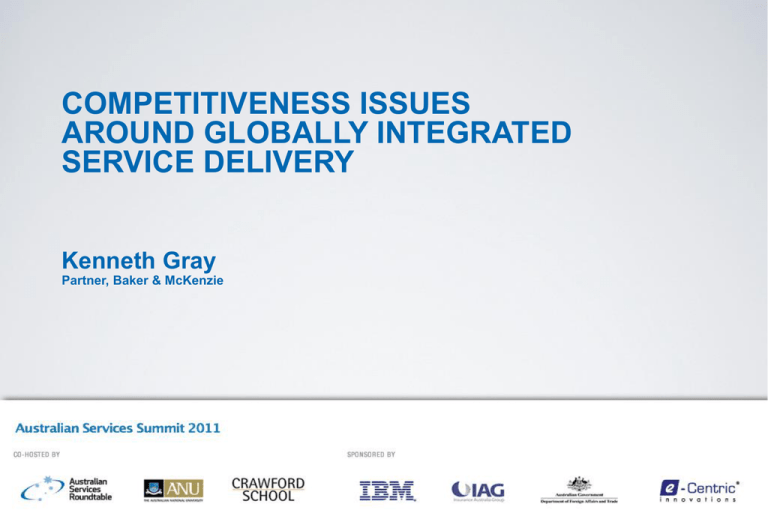
COMPETITIVENESS ISSUES AROUND GLOBALLY INTEGRATED SERVICE DELIVERY Kenneth Gray Partner, Baker & McKenzie Globally integrated service delivery Talking points • The Baker & McKenzie perspective – 60 years as a globally integrated law firm • The parochial legal profession – past, present and future • Changing client demand • Pathway to global engagement Baker & McKenzie’s Perspective • 3,750 lawyers in 68 offices in 39 countries, beginning in Chicago in 1949 • “We said that we would form a law firm that was truly international…without a nationality if that were possible…the small amount of international work we had handled…convinced us that success required dominion of languages and training in the two systems of law…involved in an international transaction…we would form a single firm or no firm…establishing a multioffice practice based on the single firm concept” Russell Baker, speaking in 1979 about the founding of the firm • a “client driven” firm looks and feels to clients (and others) like one unified, fully integrated and fluent firm, regardless of how it is organized in geographic, practice and legal terms or how it allocates costs and profits Eduardo Leite, Chairman, 2011 The Parochial Legal Profession – the past • Legal services as a “special case”: • focus on one country or state, with different laws in each place • one or two offices in one country, with cross border assignments managed by referrals, networks of agency relationships • most “global” law firms in fact practicing one system of law (English or New York) • multiple cross border practice restrictions: • use of names • sharing profits • license/bar requirements The Parochial Legal Profession – the present and future • The business model is changing, driven by clients and by competition • English and New York firms are building local capacity, to become truly global • Allen & Overy, Clifford Chance, DLA, Norton Rose • Australian firms building regional capability • Full mergers or acquisitions is the trend, away from networks and “best friends” relationships • Rise of globally focussed firms in emerging markets, especially China (King & Wood) Changing client demands - overview • Global/local capacity – with increasingly complex local environments, clients want local as well as international capacity – clients want “insiders” but expect consistent standards of quality, professionalism, communication, training, ethics and billing • Seamless service – clients expect a law firm to take responsibility for the whole of an assignment, regardless of the countries involved and to do so in an integrated and seamless manner We use the term “fluency” to describe consistent and integrated service delivery across offices and practices • The best team – clients expect subject matter experts regardless of geographic location • The value chain – client will pay top rates only for highest value services – firms must move up the value chain while finding new ways to deliver commoditised services Changing client demands – best teams • Perhaps the biggest challenge for globally integrated service delivery • Challenges include: • people mobility • “turf” issues: • matching geographic/practice organisation with client needs, to assemble the “right” team; • leadership • balancing/managing relative importance of local law input and project/subject matter expertise • remuneration and reward structures • Working across cultures – building an understanding and long term commitment (what we call a “culture of friendship”) Pathway to global engagement • Build local and offshore capacity • Bring offshore capacity in house • Build cultural understanding and friendship for the long term • Identify/develop industry/subject matter experts, to work with local experts • Focus and prioritise efforts • Adopt or adjust reward structures to incentivise fluent behaviour



